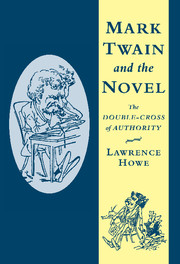Book contents
- Frontmatter
- Contents
- Acknowledgments
- List of abbreviations
- Introduction: Bearing the Double-Cross
- 1 Mark Twain's Big Two-Hearted River Text: “Old Times on the Mississippi” and Life on the Mississippi
- 2 Catching Mark Twain's Drift: The Adventures of Tom Sawyer and Adventures of Huckleberry Finn
- 3 Reinventing and Circumventing History: The Prince and the Pauper and A Connecticut Yankee in King Arthur's Court
- 4 Twaining Is Everything: The American Claimant and Pudd'nhead Wilson
- Epilogue: After the Double-Cross
- Notes
- Index
3 - Reinventing and Circumventing History: The Prince and the Pauper and A Connecticut Yankee in King Arthur's Court
Published online by Cambridge University Press: 05 September 2012
- Frontmatter
- Contents
- Acknowledgments
- List of abbreviations
- Introduction: Bearing the Double-Cross
- 1 Mark Twain's Big Two-Hearted River Text: “Old Times on the Mississippi” and Life on the Mississippi
- 2 Catching Mark Twain's Drift: The Adventures of Tom Sawyer and Adventures of Huckleberry Finn
- 3 Reinventing and Circumventing History: The Prince and the Pauper and A Connecticut Yankee in King Arthur's Court
- 4 Twaining Is Everything: The American Claimant and Pudd'nhead Wilson
- Epilogue: After the Double-Cross
- Notes
- Index
Summary
[I]n … the common analogy which likens the life power of a nation to that of an individual… lurks the recognition of an obvious truth – the truth that the obstacles which finally bring progress to a halt are raised by the course of progress; that what has destroyed all previous civilizations has been the conditions produced by the growth of civilization.
– Henry George, Progress and PovertyIn his work on the History Game and Adventures of Huckleberry Finn, Twain was not simply awakening to history but exploring a long-held fascination. In an interview in December of 1885, Jane Clemens recalled that her son “was always a great boy for history, and would never get tired of that kind of reading.” Exactly four years before her interview and the publication of Huckleberry Finn, The Prince and the Pauper had already publicized Twain's fascination with history. Four years after Jane Clemens's recollection, A Connecticut Yankee in King Arthur's Court would carry that fascination in a radical direction. Taken together, the two texts reflect in their divergent conceptions of history Twain's changing outlook. The Prince and the Pauper, produced as a respite from the frustrations of Huckleberry Finn, accepts historical tradition as the model for America's cultural destiny, thereby exhibiting the first inklings of the historical conditioning allegorized in Twain's most highly acclaimed text. A Connecticut Yankee, conversely, reacts aggressively to the ways in which history and historiography circumscribe the freedom that propelled both the novelistic conception of America and the genre Twain explored as a writer.
- Type
- Chapter
- Information
- Mark Twain and the NovelThe Double-Cross of Authority, pp. 118 - 173Publisher: Cambridge University PressPrint publication year: 1998



